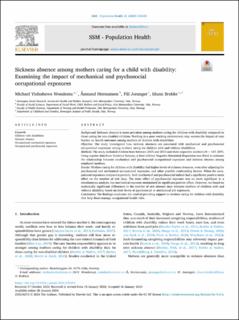| dc.contributor.author | Wondemu, Michael Yisfashewa | |
| dc.contributor.author | Hermansen, Åsmund | |
| dc.contributor.author | Joranger, Pål | |
| dc.contributor.author | Brekke, Idunn | |
| dc.date.accessioned | 2024-03-20T07:47:40Z | |
| dc.date.available | 2024-03-20T07:47:40Z | |
| dc.date.created | 2024-02-22T10:45:59Z | |
| dc.date.issued | 2024 | |
| dc.identifier.citation | SSM - Population Health. 2024, 25 1-9. | en_US |
| dc.identifier.issn | 2352-8273 | |
| dc.identifier.uri | https://hdl.handle.net/11250/3123247 | |
| dc.description.abstract | Background: Sickness absence is more prevalent among mothers caring for children with disability compared to
those caring for non-disabled children. Working in a poor working environment may worsen the impact of care
burden on health outcomes among mothers of children with disabilities.
Objective: The study investigated how sickness absences are associated with mechanical and psychosocial
occupational exposures among mothers caring for children with and without disabilities.
Methods: The study included children born between 2005 and 2013 and their respective mothers (N =147, 507).
Using register data from Statistics Norway, a Zero-Inflated Negative Binominal Regression was fitted to estimate
the relationship between mechanical and psychosocial occupational exposures and sickness absence among
employed mothers.
Results: Mothers caring for children with disability had higher levels of sickness absences, even after adjusting for
psychosocial and mechanical occupational exposures, and other possible confounding factors. When the occupational
exposures analysed separately, both mechanical and psychosocial indices had a significant positive main
effect on the number of sick days. The main effect of psychosocial exposure was no more significant in a
simultaneous analysis, but mechanical exposure maintained its significant positive effect. However, we found no
statistically significant differences in the number of sick absence days between mothers of children with and
without disability based on their levels of psychosocial or mechanical job exposures.
Conclusions: The findings emphasize the need of providing support to mothers caring for children with disability
that help them manage occupational health risks. | en_US |
| dc.language.iso | eng | en_US |
| dc.rights | Navngivelse 4.0 Internasjonal | * |
| dc.rights.uri | http://creativecommons.org/licenses/by/4.0/deed.no | * |
| dc.title | Sickness absence among mothers caring for a child with disability: Examining the impact of mechanical and psychosocial occupational exposures | en_US |
| dc.type | Peer reviewed | en_US |
| dc.type | Journal article | en_US |
| dc.description.version | publishedVersion | en_US |
| cristin.ispublished | true | |
| cristin.fulltext | original | |
| cristin.qualitycode | 1 | |
| dc.identifier.doi | 10.1016/j.ssmph.2024.101610 | |
| dc.identifier.cristin | 2248756 | |
| dc.source.journal | SSM - Population Health | en_US |
| dc.source.volume | 25 | en_US |
| dc.source.pagenumber | 1-9 | en_US |
| dc.relation.project | Norges forskningsråd: 301666 | en_US |

